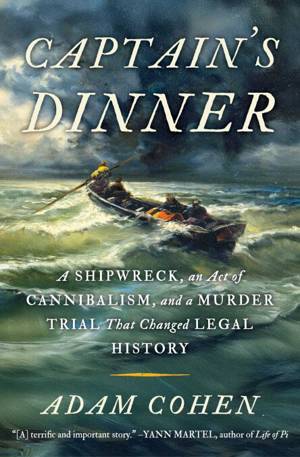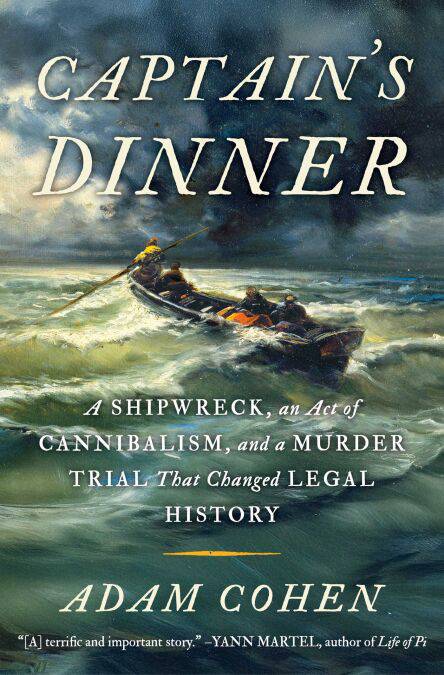
- Retrait gratuit dans votre magasin Club
- 7.000.000 titres dans notre catalogue
- Payer en toute sécurité
- Toujours un magasin près de chez vous
- Retrait gratuit dans votre magasin Club
- 7.000.0000 titres dans notre catalogue
- Payer en toute sécurité
- Toujours un magasin près de chez vous
Captain's Dinner EBOOK
A Shipwreck, An Act of Cannibalism, and a Murder Trial That Changed Legal History
Adam Cohen
Ebook | Anglais
19,00 €
+ 19 points
Description
Four men in a lifeboat. Two weeks without food. One impossible choice that would reshape the boundaries between survival and murder. “A perfect enunciation of the classic philosophical conundrum: can you sacrifice one innocent life to save many?" (Yann Martel, author of Life of Pi)
On May 19, 1884, the yacht Mignonette set sail from England on what should have been an uneventful voyage. When their vessel sank in the Atlantic, Captain Thomas Dudley and his crew found themselves adrift in a tiny lifeboat. As days turned to weeks, they faced an unthinkable choice: starve to death or resort to cannibalism.
Their decision to sacrifice the youngest—17-year-old cabin boy Richard Parker—ignited a firestorm of controversy upon their rescue. Instead of being hailed as heroes and survivors, Dudley and his crew found themselves at the center of Regina v. Dudley and Stephens, a landmark murder trial that would establish the legal precedent that necessity cannot justify murder—a principle that continues to shape Anglo-American law today.
In Captain's Dinner, acclaimed journalist, Pulitzer Prize juror, and New York Times bestselling author Adam Cohen masterfully depicts both the harrowing weeks at sea and the sensational trial that followed. "Is killing one innocent person justified if it saves the lives of three others? Cohen's answer—in this riveting account—reads like a thriller" (former U.S. Secretary of State Antony J. Blinken). Through this Victorian tragedy, Cohen reveals an enduring conflict between primal instincts and moral principles. This book will “make you think long and hard about what you might do to survive” (Ezekiel J. Emanuel, M.D., Ph.D., University of Pennsylvania).
Perfect for readers of David Grann's The Wager and Nathaniel Philbrick's In the Heart of the Sea, this pulse-pounding true story has become a real-life example of one of life's greatest moral dilemmas. “Thoroughly researched and impeccably argued” (Martel). Rich with narrative detail and real-life courtroom twists, “brilliant and profound,” (bestselling author Amy Chua), Captain's Dinner strikes at the heart of a question that haunts us all: When does survival justify murder?
On May 19, 1884, the yacht Mignonette set sail from England on what should have been an uneventful voyage. When their vessel sank in the Atlantic, Captain Thomas Dudley and his crew found themselves adrift in a tiny lifeboat. As days turned to weeks, they faced an unthinkable choice: starve to death or resort to cannibalism.
Their decision to sacrifice the youngest—17-year-old cabin boy Richard Parker—ignited a firestorm of controversy upon their rescue. Instead of being hailed as heroes and survivors, Dudley and his crew found themselves at the center of Regina v. Dudley and Stephens, a landmark murder trial that would establish the legal precedent that necessity cannot justify murder—a principle that continues to shape Anglo-American law today.
In Captain's Dinner, acclaimed journalist, Pulitzer Prize juror, and New York Times bestselling author Adam Cohen masterfully depicts both the harrowing weeks at sea and the sensational trial that followed. "Is killing one innocent person justified if it saves the lives of three others? Cohen's answer—in this riveting account—reads like a thriller" (former U.S. Secretary of State Antony J. Blinken). Through this Victorian tragedy, Cohen reveals an enduring conflict between primal instincts and moral principles. This book will “make you think long and hard about what you might do to survive” (Ezekiel J. Emanuel, M.D., Ph.D., University of Pennsylvania).
Perfect for readers of David Grann's The Wager and Nathaniel Philbrick's In the Heart of the Sea, this pulse-pounding true story has become a real-life example of one of life's greatest moral dilemmas. “Thoroughly researched and impeccably argued” (Martel). Rich with narrative detail and real-life courtroom twists, “brilliant and profound,” (bestselling author Amy Chua), Captain's Dinner strikes at the heart of a question that haunts us all: When does survival justify murder?
Spécifications
Parties prenantes
- Auteur(s) :
- Editeur:
Contenu
- Nombre de pages :
- 400
- Langue:
- Anglais
Caractéristiques
- EAN:
- 9798893310603
- Date de parution :
- 17-11-25
- Format:
- Ebook
- Protection digitale:
- Adobe DRM
- Format numérique:
- ePub

Les avis
Nous publions uniquement les avis qui respectent les conditions requises. Consultez nos conditions pour les avis.






